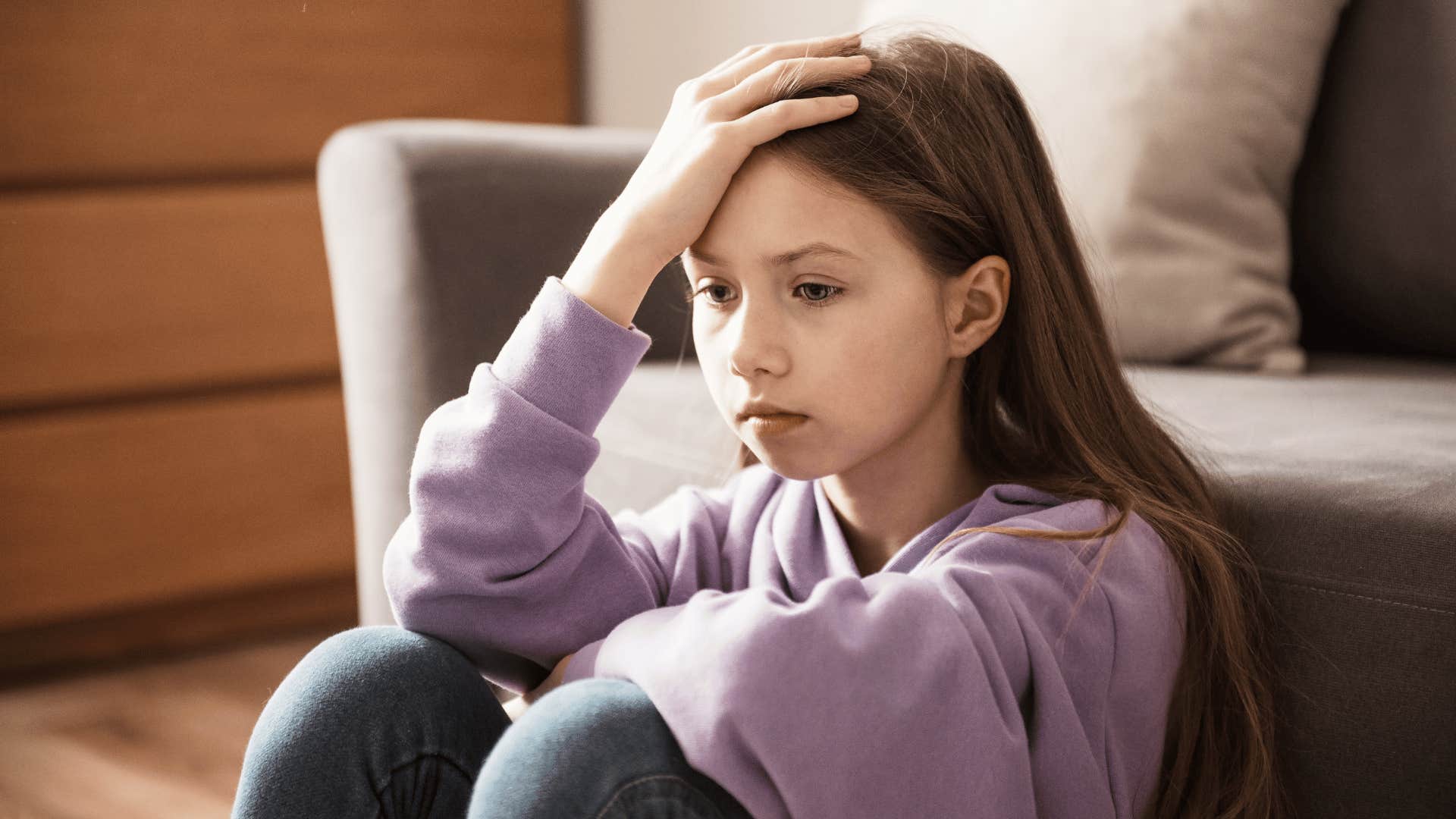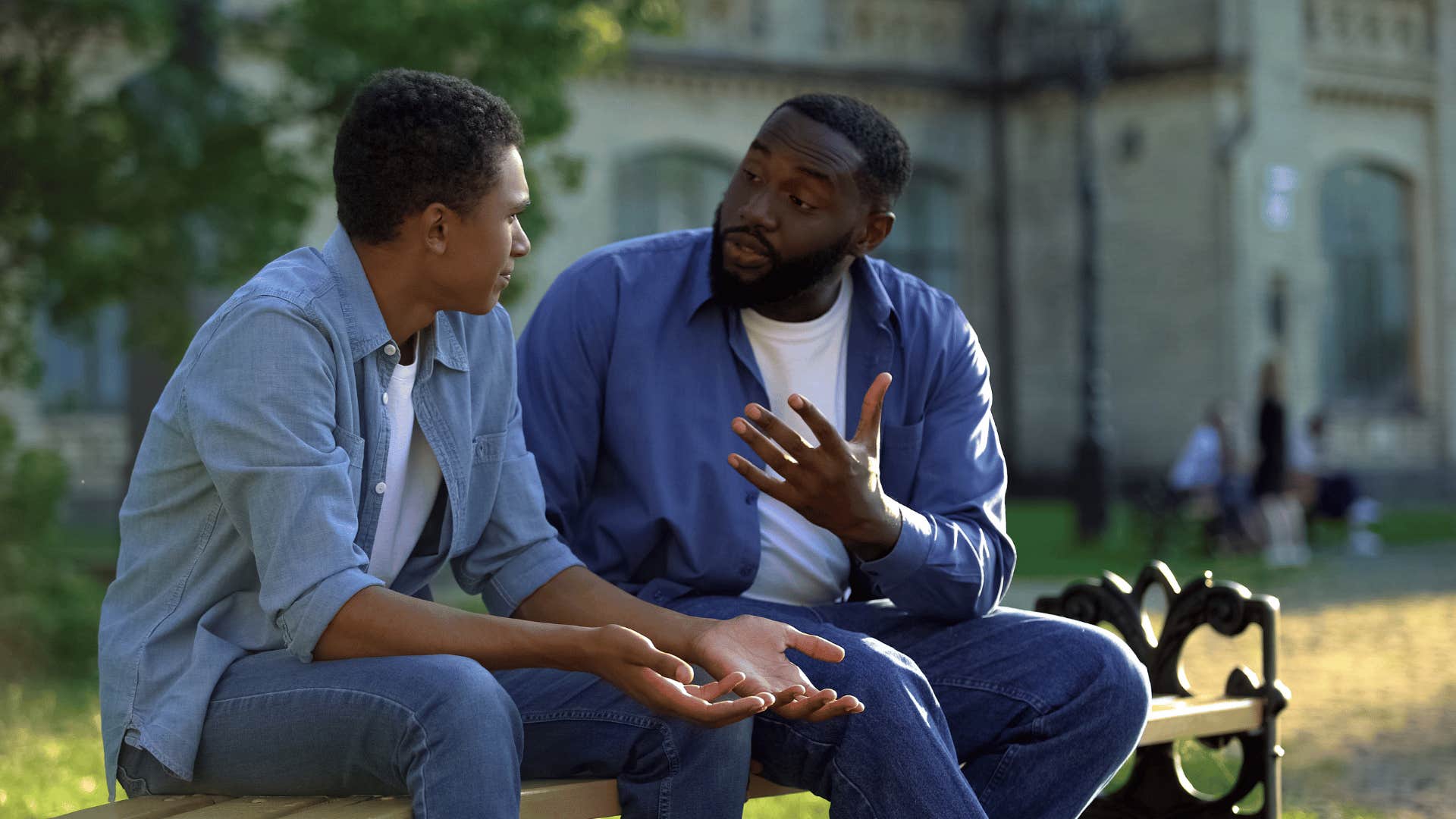Parents Who Say These 10 Phrases Usually Don't Stay Close To Their Adult Kids
Some parents are laying the groundwork for emotional distance when their kids grow up.
 Goksi | Shutterstock
Goksi | Shutterstock There are many avenues toward parental estrangement, yet a common theme among adult children who have chosen to cut off or decrease contact with their parents is that they haven't witnessed any efforts on their parents' part to change their behavior.
While parents owe their children a safe environment to grow up in, children don't owe their parents communication once they've reached adulthood, especially if emotional and physical safety wasn't provided. That's especially true if parents say specific phrases that result in them not staying close to their adult kids
While it's never an easy decision to establish distance between yourself and your parents, it can be seen as a self-protective measure. If you need space to heal, you deserve to take the time you need to do so. Parents who want to have a long-lasting relationship with their adult children should pay attention to how they speak to them when they're young.
Parents who say these 10 phrases usually don't stay close to their adult kids
1. 'You're too sensitive'
 Iren_Geo | Shutterstock
Iren_Geo | Shutterstock
Parents who tell their kids that they're too sensitive when they're younger usually don't stay close to them once they reach adulthood. The phrase "You're too sensitive" has a negative undertone and it derides children for something they're still learning to control: how they express their feelings.
By telling a child they're too sensitive, parents run the risk of their kids shutting down emotionally and not turning to them when they need help, which can create a sense of distance.
When a child lets their parents see their vulnerability, it can be extremely damaging if they respond with harsh criticism instead of acceptance. For this reason, it's important that parents communicate with openness and empathy, instead of shutting their kids down for having big feelings.
2. 'Wait until you have real responsibilities'
 zEdward_Indy | Shutterstock
zEdward_Indy | Shutterstock
Adulting is hard, but being young is difficult too in its own way. Kids and teens are faced with trying to find their place in a complicated world, where the pathways aren't always clearly defined. Sure, a kid's weekly chores might pale in comparison to what grown-ups do to maintain a household, but invalidating their experience just leads to emotional distance and harbored resentment.
Maybe their math homework isn't as hard as doing taxes, but it's hard for them, and it's their interpretation of their lived experience that matters most. Parents might justify using this phrase because it prepares kids for just how difficult the real world is, but that justification is hugely off-base for what kids need to thrive. They need to feel supported, seen, and heard, and saying, "Wait until you have real responsibilities" denies them the opportunity to feel valued.
3. 'I had it harder when I was your age'
 Dima Berlin | Shutterstock
Dima Berlin | Shutterstock
Older generations love to tell younger generations how hard life was once upon a time, but telling your kids that you had it rougher than they did ropes them into an unnecessary round of the comparison game that they didn't choose to play.
It's been reported that 27% of adult children are estranged from their parents, and it might be because their parents said things like this to them when they were young. This phrase forces kids to apologize for something they didn't cause, and it allows parents to not recognize their kids as individuals with a separate and nuanced experience from what they went through.
Maybe their parents did have to walk uphill both ways in the snow to work long hours in a factory after they went to class in a one-room schoolhouse with no electricity or running water, but that doesn't mean a kid's experience doesn't hold value. Using this phrase is a great way to alienate your kids and ensure that they stop talking to you when they grow up.
4. 'I sacrifice everything for you and this is how you repay me?'
 Sergey Novikov | Shutterstock
Sergey Novikov | Shutterstock
Parents are required to provide for their children, but weaponizing that care is a form of emotional abuse. Just because a parent kept a roof over their kid's head and fed them three meals a day doesn't give them any right to wield those basic necessities over their heads.
Unfortunately, many parents maintain the perspective that their kids owe them something, just by virtue of being cared for. Some kids get kicked out of the house the moment they turn 18, as if that arbitrary age means they don't need any more support or love. Using the phrase "I sacrifice everything for you and this is how you repay me" is an indication that a parent is withholding actual care from their kids, and they shouldn't be surprised if they don't stay close to their kids after they've grown up.
5. 'You should know better'
 Prostock-studio | Shutterstock
Prostock-studio | Shutterstock
Kids and teens are literally learning how to be people, which means they're going to mess up and make mistakes. Yet getting things wrong is crucial to the learning process.
By telling a kid that they should have known better, they're holding their child up to unfair standards. Parents can't expect their kids to know how to behave properly unless they teach them, so saying, "You should have known better" places blame on them for something that's completely developmentally appropriate.
Parents are responsible for guiding their children and teaching them how to be. If they don't do that, they can't complain that their kids should know better. Even in a situation where a child does something they know is wrong, using this phrase is a harsh and unsympathetic way to respond.
6. 'You have no right to complain'
 New Africa | Shutterstock
New Africa | Shutterstock
A parent who tells their kids, "You have no right to complain" is actively denying them the right to express how they feel. Everything is relative, which means that even a child who has all their practical needs provided can still suffer on an emotional level. Experiencing anxiety and depression cuts across class lines. Someone's social status doesn't automatically predict their mental health.
"You have no right to complain" is an example of a dismissive statement, one that parents might say without realizing how hurtful it really is. A parent who continuously tells their kids not to complain because of how good they have it is highly likely not to stay close to them once they grow up.
7. 'Don't come crying to me when it doesn't work out'
 VGStockstudio | Shutterstock
VGStockstudio | Shutterstock
No matter how old a person is, they need to feel supported on an emotional level. Even when someone spreads their wings and leaves the nest, they still need to feel like their parents are protecting them. Young adults often make impulsive decisions that don't play out well in the long-run, but knowing that their parents have their back if and when everything crashes and burns is deeply important.
Doing things wrong and making poor choices is a harsh part of the learning curve on the road to adulthood. When a parent tells their child, "Don't come crying to me when it doesn't work out," they're essentially saying that any negative consequences are well-deserved, and they won't be there to soothe their kid when something bad happens. Parents who say this shouldn't be surprised when their kids decide to go no-contact later in life.
8. 'I'm done talking about this'
 Motortion Films | Shutterstock
Motortion Films | Shutterstock
The phrase "I'm done talking about this" is a common one from parents who have a low capacity for difficult conversations. Saying this is literally shutting kids down when what they really need is space to process their thoughts and feelings. While certain topics might not be comfortable, parents need to rise above and show up for their kids as they form their own opinions and perspectives on the world around them.
Psychologist Dr. Barbara Becker Holstein explained the steps parents can take to establish conversational trust and help their kids open up. She recommended that parents take time alone with their kids to give them an opportunity to ask tough questions. She also advised parents to share their own experiences, which humanizes them and allows their kids to know that they aren't perfect. "Keeping it real with your kids will make you more relatable and attainable, helping them feel not loved, but heard and understood as well," Dr. Holstein concluded.
Parents who don't commit their time and energy to providing their kids with a safe space to have hard conversations will likely end up not being close with them once they've grown up.
9. 'You should be grateful'
 PeopleImages.com - Yuri A. | Shutterstock
PeopleImages.com - Yuri A. | Shutterstock
Practicing gratitude is hugely important for a person's psychological well-being and overall sense of happiness, but telling a child that they should be grateful for what they have is a form of guilt-tripping. Parents who use this phrase can create feelings of resentment in their kids, as they'll feel like they're not being heard. Kids have the right to express their disappointments, even when it's hard for parents to hear them.
It's highly possible that kids who hear this phrase from their parents will withdraw emotionally as they get older. Because they weren't given the connection they needed when they were younger, they probably won't stay close with their parents as they get older.
10. 'I don't care what you want'
 LeManna | Shutterstock
LeManna | Shutterstock
When parents tell their kids, "I don't care what you want," it makes them feel completely diminished and dismissed. Using this phrase can negatively affect their sense of confidence and self-worth, and make them believe that they shouldn't have wants or needs or express how they feel. Kids who are told that their parents don't care what they want can easily translate that into "I don't care about you."
Parents might not want to give their kids unlimited screen time or let them eat dessert first, but kids are still allowed to say what they want, even when it isn't a practical request. By not recognizing or validating their desires when they're young, kids might grow up to think that they don't deserve to get what they want. By using this phrase, parents lay the groundwork for fissures that create emotional distance when their kids grow up.
Alexandra Blogier is a writer on YourTango's news and entertainment team. She covers social issues, pop culture analysis and all things to do with the entertainment industry.

